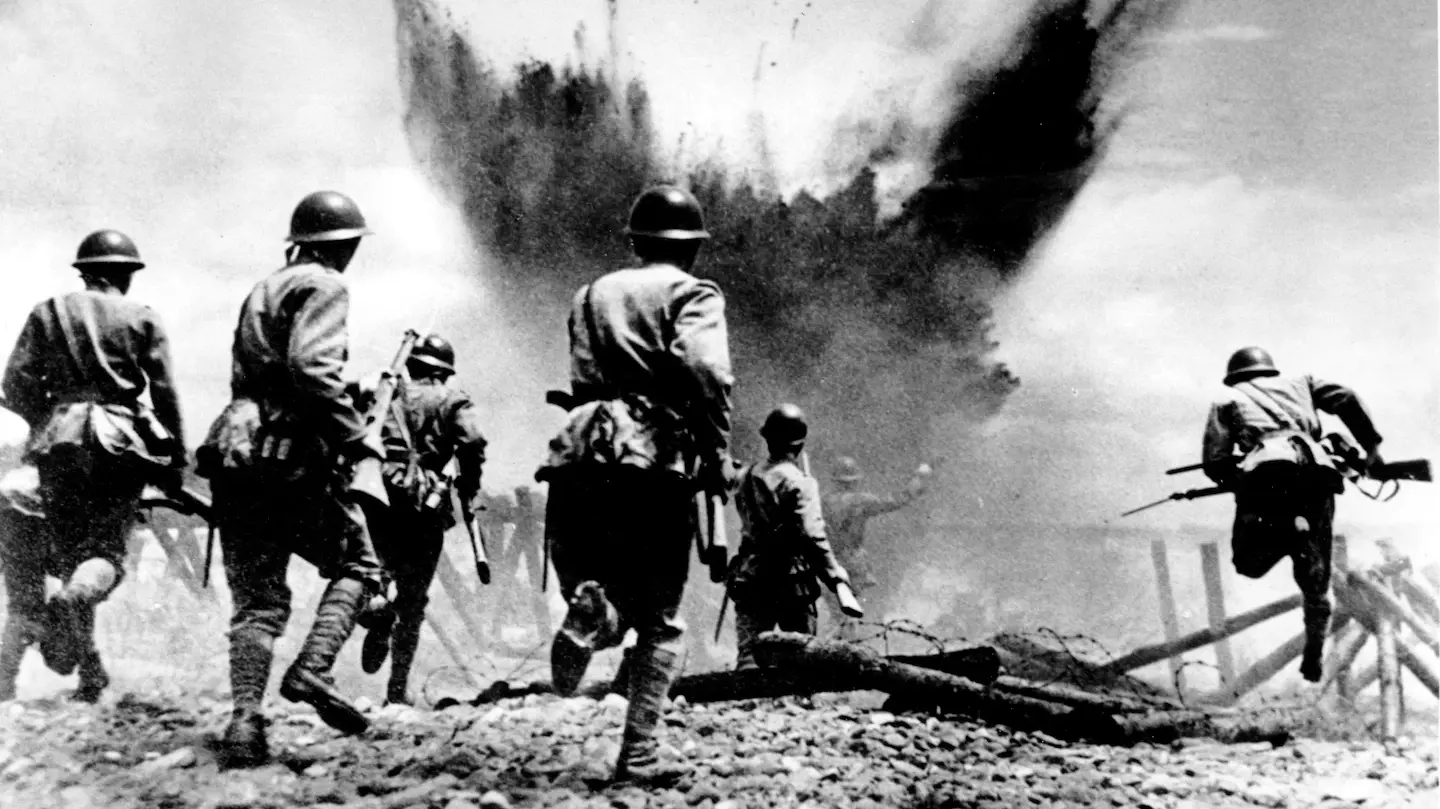by Fr Ken Webb FSSP (Originally published 2008)
We are publishing an article that is as relevant today as it was when it was written. Many are concerned about the immediate future of the world: wars in Ukraine and Israel, cyber wars between China and the West, and Christian persecution in Nigeria. There are many irregular conflicts in the world that do not fit the pattern of normal warfare as we have historically known it. This article delves into the Catholic principles of just war theory and applies them to irregular conflicts. Even though the historical circumstances of the conflicts under examination may have changed- the principles and their application has not.
One of the striking characteristics of modern war is the prevalence of “small wars” – wars of revolution, counter- insurgency (COIN), and guerrilla or terrorist campaigns waged by small irregular armies against conventional forces. The wars currently being fought by the United States and its coalition partners in Iraq and Afghanistan; the long simmering Islamist insurgencies in the Philippines and southern Thailand; and a host more besides all now pose for our consideration a special set of questions and problems relating to war and morality. Is the classical just war doctrine able to provide moral guidelines and evaluative criteria for examining the morality (or otherwise) of these particularly complex, unconventional types of war?
There are some who would claim that the classical just war doctrine is at best hopelessly outdated and rigid, unable to offer any guidance especially in the fluid and atypical circumstances that characterise COIN and revolutionary or guerrilla warfare. Others would argue that the just war doctrine is in fact nothing so much as a veritable licence and moral cloak which allows modern conventional armies to justify any atrocity against an irregular insurgent force.1 In this essay I will argue that the classical just war doctrine does in fact contribute a great deal towards formulating criteria by which we can evaluate whether and to what extent modern COIN and guerrilla warfare can be waged in a manner that is morally licit.

Clarifying terms
Before we begin our analysis, it is helpful to clarify several key terms, as well as some unique characteristics of the kind of unconventional wars that we will be considering that distinguish them from the more conventional conflicts such as World War II. The first feature to note is that revolutionary and counter-insurgency wars may in fact be fought by belligerents who at various times possess forces that range from small terrorist cells, to irregular guerrilla forces, through to full conventionally equipped armies. Historically, however, the principal means by which these wars have tended to be waged is by insurgents who engage in guerrilla warfare, using tactics of ambush and hit-and-run against their larger and conventionally armed foes, who are normally much stronger militarily than are the insurgents. This pattern would usually continue until the insurgents were actually able to take on their enemy in an open conventional battle.
The second key feature of COIN and revolutionary war is that it is waged by at least one side for radical political, religious and ideological objectives which often will conflict with the standards of conduct demanded by both the criteria of the jus ad bellum and the jus in bello conditions of the classical just war doctrine. Whether it be the Marxist-Leninist ideological inspiration or the omnipresent Islamic jihads being waged in our own times, the fact remains that modern COIN and revolutionary wars have a very pronounced ideological aspect to them, and this tends to make even more complex any moral evaluation.
By the term “guerrilla war” is meant irregular warfare waged by small armed groups acting independently of any formal central command authority.2 Guerrilla warfare is a tactic used by a weak belligerent against a stronger enemy, and it is one with a very long history. Since 1945, though, it is fair to say that guerrilla war has taken on an overt ideological aspect, whether it be Marxist-Leninist or Islamist-inspired. This ideological element is relevant because it tends to modify guerrilla tactics and thus the manner in which war is waged, and this in turn has significant implications from the moral point of view, and raises some specific problems from the perspective of the demands of jus in bello, which is concerned with the tactics that are employed in the waging of a just war.
Counter-insurgency (COIN) war is the military and political operations of a sovereign state and/or its allies against armed insurgents. It is historically the role which Western armies have assumed in the last fifty years, as instanced by France in Algeria, the US in Vietnam, and the much more successful example of Britain in Malaya. This is also the kind of war in which the US and its allies are now fighting in Iraq and Afghanistan. Particular attention will be paid to the issues raised by the demands of fighting COIN warfare in a just manner, as they obviously have direct implications for any moral evaluation of military operations in which many western armies are currently involved. These will be discussed in a future article. But before one evaluates the tactics used to prosecute a war, one must first determine whether the war has been declared on morally acceptable grounds. This is the concern of the jus ad bellum.

Lawful authority
A condition which insists that a just war may only be declared by a supreme political authority obviously poses a difficulty in the case of domestic insurgency or rebellion. It is this very authority which is being rejected by the rebels. There can be little dispute that at least in the initial stages of a rebellion, the forces of the state have the authority to wage war against the insurgents. There is a question, however, as to precisely how long this authority may be insisted upon, especially when the rebel cause is a just one.
A condition which insists that a just war may only be declared by a supreme political authority obviously poses a difficulty in the case of domestic insurgency or rebellion. It is this very authority which is being rejected by the rebels. There can be little dispute that at least in the initial stages of a rebellion, the forces of the state have the authority to wage war against the insurgents. There is a question, however, as to precisely how long this authority may be insisted upon, especially when the rebel cause is a just one.
St Thomas Aquinas considers the conditions under which it would be morally legitimate for a people to rebel against their rulers. When these conditions are met, then rebellion takes on the nature of self defence of a people against an unjust aggressor. Such a war further has the character of a war fought to restore rights and justice unlawfully suppressed by a government. Aquinas states that when a government, through its own actions has become tyrannical and oppressive, as when it violates the tenets of the natural law or acts in a way contrary to the common good, then that government has lost its legitimacy and it not only may be justly overthrown, but there may in fact be an obligation for the citizens to rebel against such a government.3
There is a question as to whether an incumbent unjust regime, by virtue of constituting the government at the time the rebellion began, retains lawful authority to wage war until it is overthrown by force of arms. Since it is not possible for a war to be just on both sides4 (although both sides may claim that they are acting justly), it is not reasonable to maintain that an unjust belligerent waging war against a just rebellion could claim to be waging war with lawful authority. Since a brutal and tyrannical government has in fact lost the moral authority to govern, the lawful authority to wage war must be held to reside with the rebels. Since only a lawful authority may declare war, any declaration of war by an unlawful authority is manifestly unjust. Any regime subject to a lawful rebellion based on the standard established by Aquinas is ipso facto fighting an unjust war. While the determination that a regime is in fact lacking lawful authority and waging an unjust war is probably not going to compel it to surrender to the rebels, such a moral determination is quite relevant in establishing whether a belligerent is engaged in a just war, and may have immediate impact upon whether other nations will render or withhold military, political or economic assistance based on such a moral calculation.

Just cause
While classical just war theorists are inclined to restrict the grounds which would justify taking up arms against a government, they are nevertheless precise in setting forth the conditions which would render a rebellion just. St Thomas first states that sedition as such is morally wrong, because it is contrary to the unity of the people and the common good. However he then notes that:
“A tyrannical government is not just, because it is directed, not to the common good, but to the private good of the ruler, as the Philosopher [Aristotle] states. Consequently there is no sedition in disturbing a government of this kind, unless indeed the tyrant’s rule be disturbed so inordinately, that his subjects suffer greater harm from the consequent disturbance than from the tyrant’s government.”5
It is clear from these conditions that if a rebellion is to be morally justified, a government must be acting in a tyrannical way; that is it must be oppressing the people by denying them the most basic rights that all are entitled to under the natural law. Mere political or economic differences, no matter how strongly held, cannot justify rebellion against a lawful authority. The presumption is against the legitimacy of a rebellion unless the government is clearly and systematically ruling in a manner contrary to the common good. When such circumstances exist, and all of the other criteria for a just war are also present, then as Francisco Suárez writes, “the whole state, or any portion thereof, has the right [to revolt] against the prince” and such a rebellion would be a just war.6
Although just cause may exist in the face of an oppressive government, the jus ad bellum requirement also insists upon the test of proportionality. Aquinas and Suárez both insisted that the evil consequences of the war must not exceed the evil inflicted upon the people by rebellion. If the insurgency cannot be waged successfully without simply initiating a holocaust of combatants and innocent civilians alike, and if it has little prospect of success, then such a rebellion would be unjust. This condition is in clear contrast to both Marxist-Leninist- inspired revolutionary war and Islamic jihadist-inspired war; the former presupposes the inexorable victory led on by the force of history itself, along with an a priori “just” end which is held to justify any means necessary; and the latter relying upon the commandment of Allah to wage war against infidels, certain in divine sanction for their cause, and also presuming a self-evidently “just” end which also permits the use of any means available. The problem posed by revolutionary and jihadist ideological justifications for war is that based upon these two perspectives, there is simply no such thing as a requirement for proportionality, from the point of view of either the jus ad bellum or the jus in bello.
Ideologically fuelled revolutionary insurgencies, and the theories motivating them, do not lend themselves to moral restrictions on their actions, whether such restrictions be derived from the classical just war doctrine or from anywhere else.
Yet it should be recalled that the nature of ideologically based insurgency warfare is not such that the moral limitations and rational conditions of the classical just war doctrine can simply be regarded as ceasing to operate. War, after all, is war, and the moral constraints which are held to bind civilised belligerents in conventional war must also govern their activity in unconventional warfare. Moral principles do not cease to be operative simply because they conflict with the ideological presuppositions or methods employed by one of the belligerents.
Indeed, given the often highly politically and emotionally charged nature of COIN warfare and operations, a belligerent who strives to adhere to the restrictions of the just war doctrine may well find it to his advantage, in terms of the propaganda war inevitably fought, to win “hearts and minds” to the cause. This is perhaps particularly a point to be noted by the (usually Western) counterinsurgency army – it was recognised by the British in their successful operation in Malaya, and it is disregarded at one’s peril, as evidenced by the operations of the French in Algeria and Indo-China. A side which takes seriously the demands of both discrimination and proportion would be much less likely to alienate or antagonise the civilian population, as opposed to one who either cares nothing for the views of the ordinary people, or indeed who wishes to terrorise them into compliance.

Right intention
When it comes to the question of determining right intention in the case of unconventional warfare, each case must be evaluated on its own merits, with account being taken of the ideological, political and military aspects of each war. Such an account would include both the stated and also the actively demonstrated intentions and methods of each belligerent.
An evaluation of the warring sides in terms of the conditions established by the jus ad bellum criteria (to secure a just peace, punish an evildoer, protect the common good) is still the most rational and nuanced intellectual means available for evaluating whether or not a belligerent could be held to be engaged in a just war. Indeed, it would seem that not only does it offer the best means of morally evaluating such wars, but the classical just war doctrine also offers what is perhaps the best hope for restricting their conduct, as we shall see when we examine revolutionary and COIN warfare from the point of view of the conditions established for the actual conduct of warfare by the jus in bello.
Notes
- Donald Wells, “Vietnam and the Calculation of Atrocities,” Journal of Social Philosophy (Summer 1973), p. 14. ↩︎
- John Pimlott, ed., Guerrilla Warfare (New York: Bison Books Ltd., 1985), p. 8. ↩︎
- St Thomas Aquinas, Summa Theologiae, II-II, Q. 42, a. 2. ↩︎
- Francisco Suárez, SJ, The Three Theological Virtues, Disp. XIII, sec. IV, p. 816. ↩︎
- Aquinas, op. cit., II-II, Q. 42, a. 2. ↩︎
- Suárez, op. cit., Disp. XIII, sec. VIII, p. 855. ↩︎

